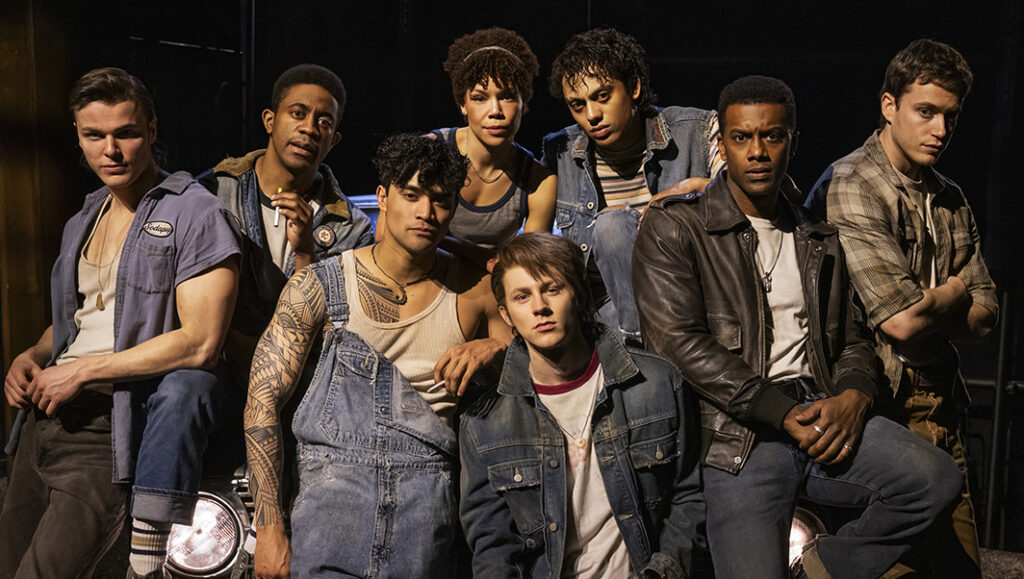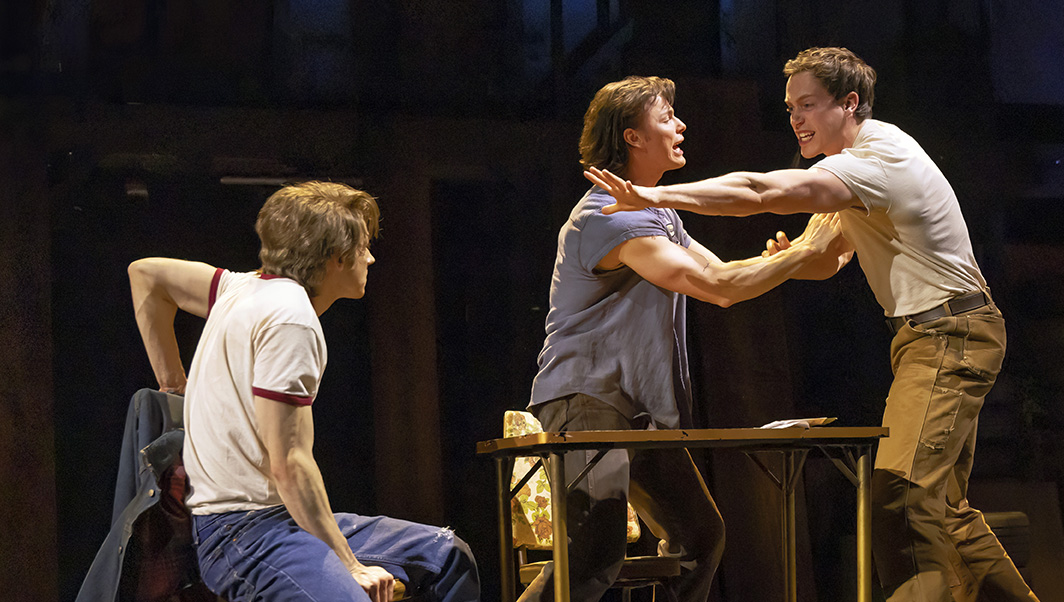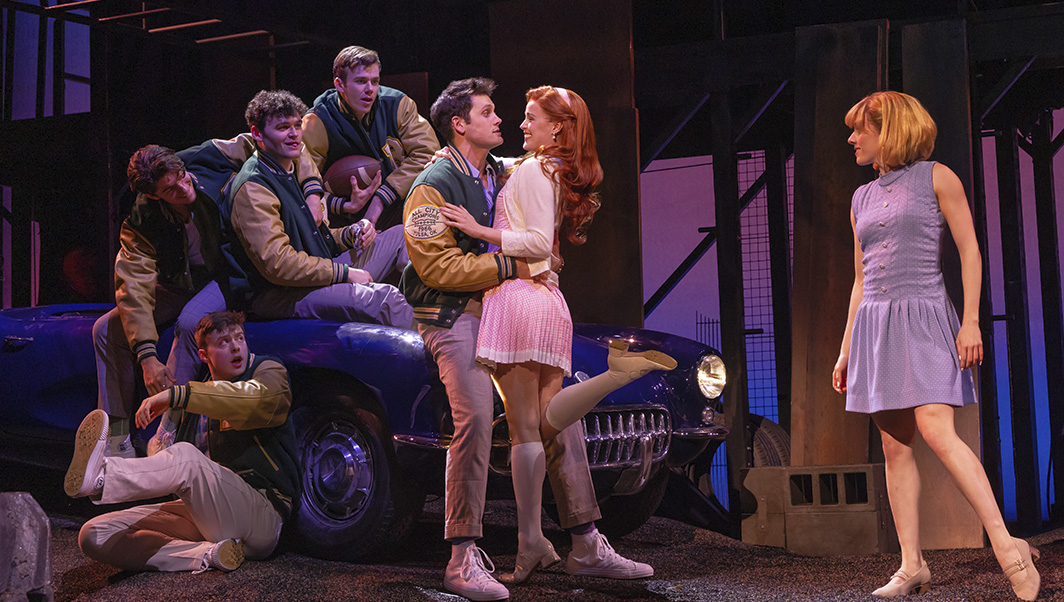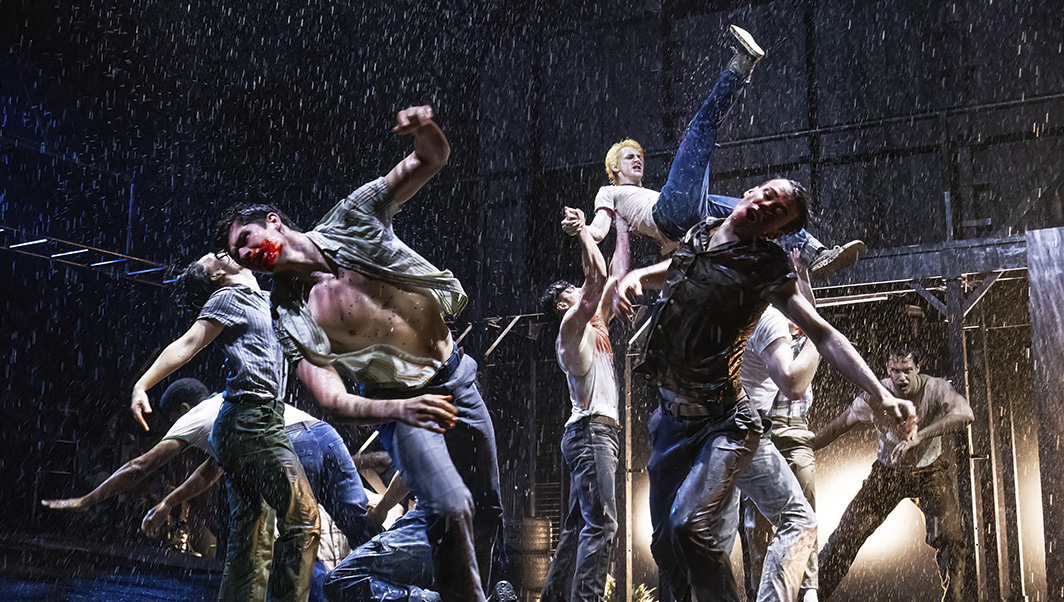Broadway Adaptation of ‘The Outsiders’ Stays Gold and Exceeds Great Expectations

Transported to Tulsa, Oklahoma in 1967, The Outsiders musical pays homage to S.E. Hinton’s timeless novel and Francis Ford Coppola’s motion picture, delving into the intense rivalry between the Greasers and the Socs against a rustic backdrop. Echoing the poignant themes of class, chosen family, and identity that resonate throughout the pages of Hinton’s iconic work, this production unfolds with music evocative of the Great American Songbook and performances that exhibit both nuance and complexity. Under the watchful direction of Danya Taymor and with words by Adam Rapp, this adaptation of The Outsiders revitalizes a classic that defined a generation, inviting audiences to rediscover its enduring relevance.
As our story begins, we find ourselves introduced to fourteen-year-old Ponyboy, the youngest of the three Curtis brothers, who deftly unveils the long-standing feud between the Greasers of the East side and the affluent Socs residing on the West. In his Broadway debut, Brody Grant commands the stage brilliantly in this pivotal role, embodying Ponyboy’s resilience, introspection, and vulnerability, while also infusing the character with his own distinct charm. Grant captures Ponyboy’s profound connection to literature and film, illustrating how, despite his circumstances, the arts provide him with both refuge and a means of escape from the everyday struggles of life, and the cards that he’s been dealt.
In one of the standout numbers of the musical “Great Expectations,” inspired by Charles Dickens’ novel, Grant’s voice serves as a compelling contrast, both hopeful and heartbreaking. As he delivers the poignant lyrics by Jamestown Revival (Jonathan Clay and Zach Chance) and Justin Levine, he infuses his vocals with a sense of optimism, yet beneath the surface lies a deep sorrow. Grant encapsulates the essence of Ponyboy, establishing himself as a different type of Greaser, one who yearns for a life beyond the confines of this small town.
That profound moment extends beyond the stage, prompting the audience to reflect on whether our lives are predetermined by our circumstances. This question resonates deeply as we consider the journey of Darrel, Ponyboy’s older brother, who seemed to have everything on track until tragedy struck. With the sudden loss of their parents in a car accident, Darrel was thrust into the role of a father figure, forced to mature and shoulder the responsibility of providing for his siblings. Brent Comer, also making his Broadway debut, adeptly embodies the weight of Darrel’s responsibility with such emotional depth and maturity, compelling audiences to feel the gravity of his situation in an incredibly visceral way.

Similarly, Johnny Cade, Ponyboy’s best friend, grapples with both inner and external challenges following a recent altercation with the Socs. Raised in an abusive, alcoholic environment, Johnny bears emotional scars that actor Sky Lakota-Lynch captures with poignant restraint, conveying the rawness of his pain and the lasting impact of his tumultuous upbringing, as evident in his heart-wrenching rendition of “Stay Gold.” Yet, amidst the darkness, he still embodies a sense of hope, a beacon of resilience amidst adversity. Their friendship emerges as a central theme in The Outsiders, beautifully illustrating the concept of chosen family, though there’s a missed opportunity to fully feel its weight in Act 2. Nevertheless, it poignantly captures the bond between Ponyboy and Johnny.
This narrative thread is further exemplified in the character of Dallas “Dally” Winston, portrayed by Joshua Boone. Boone’s interpretation brings a refreshing perspective to Dallas, unveiling a more empathetic and nurturing side, diverging from his typically cold and hardened portrayal in the source material. It’s Dally whom Ponyboy and Johnny turn to as things begin to escalate between the Greasers and Socs.
At the helm of the Socs reigns Bob Sheldon, the imposing ringleader whose entitlement and hot-headed demeanor fuels much of the story’s conflict. It’s his clashes with Ponyboy and Johnny that drive the narrative forward, especially when he witnesses his girlfriend, Cherry Valance, bonding with Ponyboy over their shared love of literature at the Friday night drive-in. Kevin William Paul‘s depiction of Bob is commanding and delivered with such conviction that it elicits immediate reactions from theatergoers, leaving an indelible impression. Meanwhile, Emma Pittman embodies the complexities of Cherry with a quiet confidence, showcasing her pivotal role in bridging the gap between the Socs and Greasers and providing insight into the struggles within the Socs community.

As tensions reach a boiling point in Act 1, the unthinkable occurs, setting Ponyboy and Johnny on the run. It’s during this darkest hour that we witness Sodapop, the middle Curtis brother often hailed as the heart of the family, truly stepping into that role. Jason Schmidt delivers the definitive performance as Sodapop, illuminating the stage with his magnetic energy and youthful exuberance. He infuses Sodapop’s carefree exterior and deeply sensitive soul with an invigorating spirit. In his hands, Sodapop’s unwavering loyalty to his family reverberates powerfully, especially in the show-stopping number, “Throwing in the Towel.”
Despite the minimalist set design in The Outsiders, the cast brings richness and authenticity to the material. This simplicity allows for a deeper connection between the actors and the audience. While the open stage presents creative opportunities, particularly evident in Act 2, one might question if additional avenues were left unexplored. Nonetheless, the collaboration between Brian MacDevitt (lighting) and Cody Spencer (sound) enhances each scene, vividly portraying 1960s Tulsa and immersing the audience in the essence of the story. Together, their work transforms the stage into a captivating realm where the tale unfolds with striking clarity.
Rick and Jeff Kuperman expertly utilize the open stage with purposeful choreography, where every movement adds to the intrigue. Their attention to detail is evident, especially in the iconic rumble scene of Act 2, set to become a highlight of this theater season. The choreography engages all the senses, blending violence, sensuality, physicality, and intensity, adding color to the characters’ conflicts and emotions. Kudos to the entire ensemble, whose skill and commitment infuse vitality into these dynamic movements, elevating the choreography to new heights.

Sarafina Bush (costumes) deserves equal praise for her ability to depict the economic disparity between the Greasers and the Socs through attire. The Greasers’ worn and working-class clothing stands in stark contrast to the polished appearance of the Socs, especially with their trademark letterman jackets.
Hana Kim’s projection design captures the escapism that Ponyboy finds through cinema. Her work creates an immersive viewing experience, enhancing the visual impact of the production. However, the effect may vary for each audience, depending on their perspective within the Bernard B. Jacobs Theatre.
Overall, the Broadway adaptation of The Outsiders offers an inspiring take on the timeless classic, poised to captivate a new audience. As it graces the Broadway stage, The Outsiders stands as a testament to the enduring power of storytelling to transcend generations and unite audiences of all ages, reminding us to “stay gold” in the face of life’s challenges.
★ ★ ★ ½ out of 4
The Outsiders is playing at the Bernard B. Jacobs Theatre. For more information and tickets, click here.
Photo Credit: Matthew Murphy


Discussion about this post